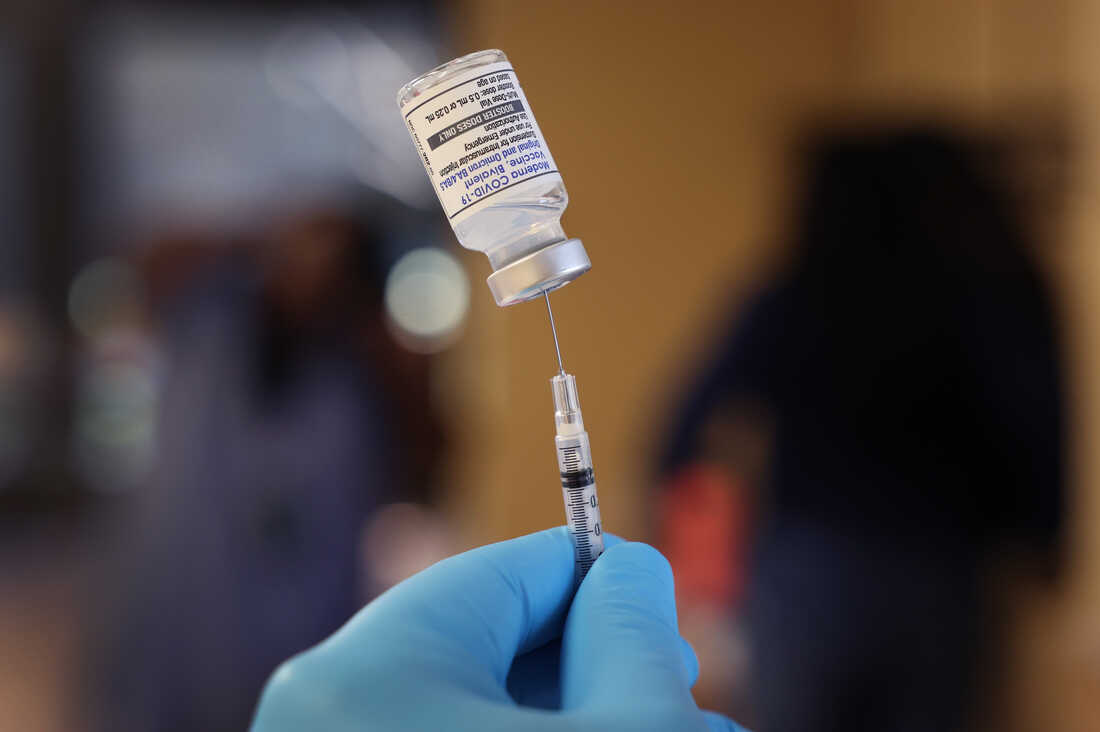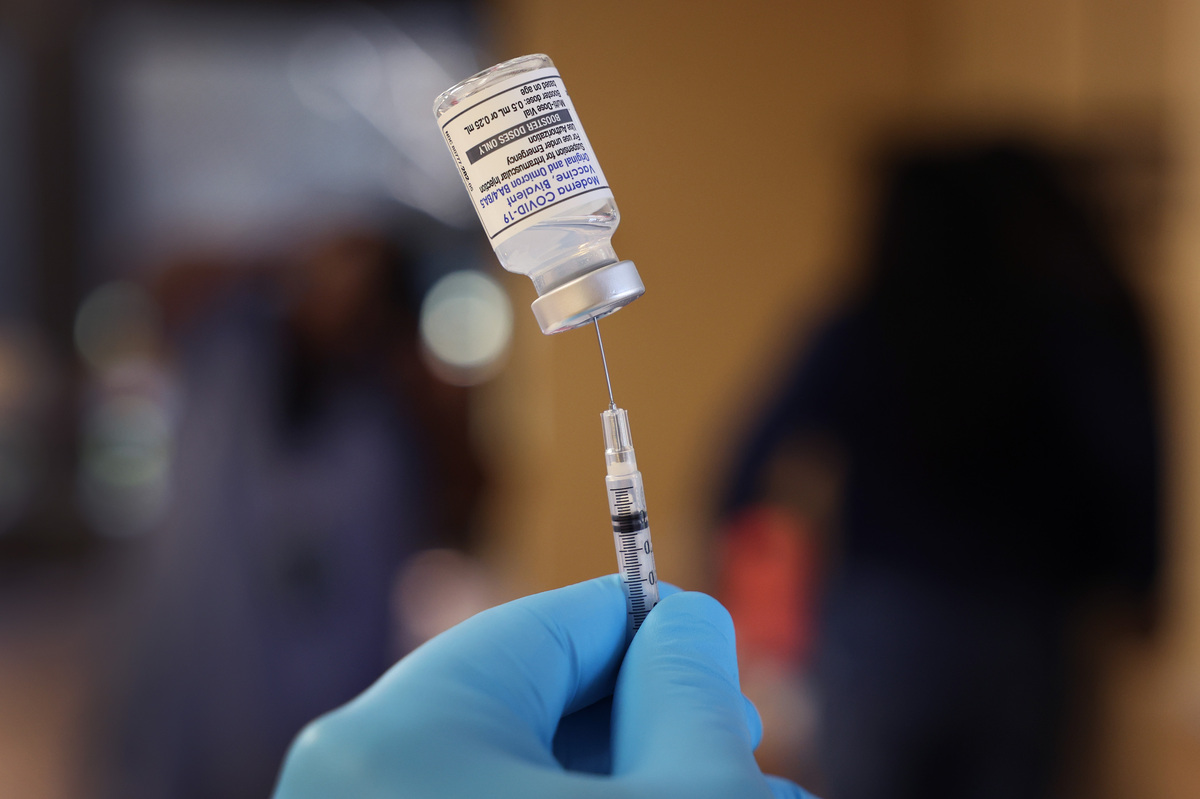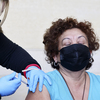
[ad_1]

Advisers to the Centers for Disease Control and Prevention have backed a broad rollout of latest COVID-19 boosters.
Scott Olson/Getty Images
cover caption
toggle caption
Scott Olson/Getty Images

Advisers to the Centers for Disease Control and Prevention have backed a broad rollout of latest COVID-19 boosters.
Scott Olson/Getty Images
President Biden just lately had an expertise that many people have gone by these days — a member of the family examined optimistic for COVID-19. It was first girl Jill Biden.
And like many people, Biden confronted the query: Should I cancel my very own plans and isolate?
Unlike the remainder of us, he had a press secretary readily available to reply. This is the trade between a reporter and White House press secretary Karine Jean-Pierre after the primary girl’s analysis.
Reporter: If President Biden does take a look at optimistic for COVID within the coming days, we are able to assume he isn’t going to journey to India?
Jean-Pierre: I’m simply not gonna get into hypotheticals. I’m actually not. There’s no updates to his schedule. That’s the place we’re proper now. He examined damaging final night time. He examined damaging at this time. That’s what issues.
It looks as if folks throughout us are testing optimistic for COVID, whilst few of them change into severely in poor health.
Now the Food and Drug Administration has accepted up to date boosters, and on Tuesday, advisers to the Centers for Disease Control and Prevention recommended them for everyone 6 months and older.
So how ought to we be navigating the coronavirus pandemic proper now?
All Things Considered‘s Ari Shapiro spoke to Dr. Robert Wachter, the chair of the division of drugs on the University of California, San Francisco, about easy methods to assess the dangers.
This interview has been frivolously edited for size and readability.
Interview highlights
Ari Shapiro: To begin with simply, like, a headline in a sentence or two, how would you describe the place we’re on this second?
Robert Wachter: Worse than we have been a month or two [ago] and considerably higher than we have been most occasions within the final three or 4 years. So it is undoubtedly an uptick, however it nonetheless is nowhere close to the sorts of surges that slammed us previously few years.
Shapiro: Just anecdotally for me, it looks as if everybody from members of the family to co-workers is getting a analysis and never being debilitated by it. Is that what the science bears out too?
Wachter: Yeah. I obtained my first case of COVID two months in the past. That’s a reasonably frequent story.
The science says that the truth that we primarily have 100% inhabitants immunity — you can not discover anybody now who has neither been vaccinated nor been contaminated. And in most individuals, they’ve gotten each. So the virus does not discover any people anymore which have zero immunity. That’s clearly very completely different than 2020. And what meaning is that when it strikes people — and it nonetheless is giving lots of people COVID — the circumstances are typically considerably milder than they have been earlier than. There are nonetheless folks dying of COVID, however the probabilities of getting super-sick, going to the hospital and dying are a lot, a lot decrease than they have been a few years in the past.
Shapiro: And so now there’s this up to date booster. Doctors have been saying for years that getting a COVID vaccine would possibly change into an annual routine like a flu shot. Is that the place we have landed at this level?
Wachter: I feel so. It’s sophisticated as a result of it is a bit of little bit of four-dimensional chess that you have to play.
The boosters do 4 various things, and the relevance of these issues differ relying on who you’re and the way previous you’re and whether or not you have got different medical sicknesses.
The very first thing they do, fairly reliably, is decrease the possibilities you are going to get very sick, go to the hospital and die. And that’s most related to people who find themselves vulnerable to these issues.
But there are different advantages that to me tilt the scales to favoring the vaccine and the booster in just about all people. It lowers the probabilities of getting lengthy COVID. It lowers the probabilities of getting COVID, however just for a few months. And if you happen to do get COVID, it reduces the period of time that you just’re sick — not by a ton however by a bit of bit.
So I take into consideration this as a health care provider and the advantages versus the dangers of all the pieces we do — like deal with hypertension, ldl cholesterol. It’s a straightforward determination for an older particular person or somebody with medical co-morbidities to get the booster as a result of they’re at vital danger of a extreme case.
And to me, after I speak to my 3o-ish-year-old wholesome children, I like to recommend they get the booster. I do not suppose it is a slam dunk for them, however I take into account it actually fairly, fairly secure. I feel the advantages outweigh the dangers in just about all people.
Shapiro: Do you apply the identical sort of risk-protection calculus to among the practices that have been so frequent a few years in the past, from mask-wearing to social distancing to out of doors eating? Or is this type of like chilly and flu season the place you exit in public, you’re taking your probabilities and you reside your life?
Wachter: The danger evaluation is difficult. It’s not simply the danger to you, however are you residing with different susceptible folks? And that has to get factored in too. And then how a lot COVID is there within the surroundings? So that is why it’s extremely difficult to type this out.
But, yeah, I feel that is a good mind-set about it. The identical sort of considering that goes into the significance of getting boosted additionally goes into your interested by how cautious to be. So in case you are an older one that’s susceptible and there is a spike in COVID circumstances, as there’s now, it’s a time the place you need to be interested by masking, interested by forgoing indoor eating, interested by taking Paxlovid if you happen to get COVID.
So this type of drives folks a bit of bit loopy as a result of it truly is such a multidimensional and difficult determination.
[adinserter block=”4″]
[ad_2]
Source link
